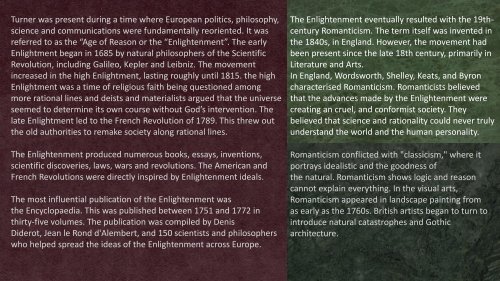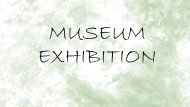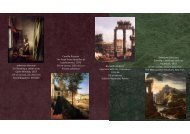You also want an ePaper? Increase the reach of your titles
YUMPU automatically turns print PDFs into web optimized ePapers that Google loves.
Turner was present during a time where European politics, philosophy,<br />
science and communications were fundamentally reoriented. It was<br />
referred to as the “Age of Reason or the “Enlightenment”. The early<br />
Enlightment began in 1685 by natural philosophers of the Scientific<br />
Revolution, including Galileo, Kepler and Leibniz. The movement<br />
increased in the high Enlightment, lasting roughly until 1815. the high<br />
Enlightment was a time of religious faith being questioned among<br />
more rational lines and deists and materialists argued that the universe<br />
seemed to determine its own course without God’s intervention. The<br />
late Enlightment led to the French Revolution of 1789. This threw out<br />
the old authorities to remake society along rational lines.<br />
The Enlightenment produced numerous books, essays, inventions,<br />
scientific discoveries, laws, wars and revolutions. The American and<br />
French Revolutions were directly inspired by Enlightenment ideals.<br />
The most influential publication of the Enlightenment was<br />
the Encyclopaedia. This was published between 1751 and 1772 in<br />
thirty-five volumes. The publication was compiled by Denis<br />
Diderot, Jean le Rond d'Alembert, and 150 scientists and philosophers<br />
who helped spread the ideas of the Enlightenment across Europe.<br />
The Enlightenment eventually resulted with the 19thcentury<br />
Romanticism. The term itself was invented in<br />
the 1840s, in England. However, the movement had<br />
been present since the late 18th century, primarily in<br />
Literature and Arts.<br />
In England, Wordsworth, Shelley, Keats, and Byron<br />
characterised Romanticism. Romanticists believed<br />
that the advances made by the Enlightenment were<br />
creating an cruel, and conformist society. They<br />
believed that science and rationality could never truly<br />
understand the world and the human personality.<br />
Romanticism conflicted with "classicism," where it<br />
portrays idealistic and the goodness of<br />
the natural. Romanticism shows logic and reason<br />
cannot explain everything. In the visual arts,<br />
Romanticism appeared in landscape painting from<br />
as early as the 1760s. British artists began to turn to<br />
introduce natural catastrophes and Gothic<br />
architecture.





